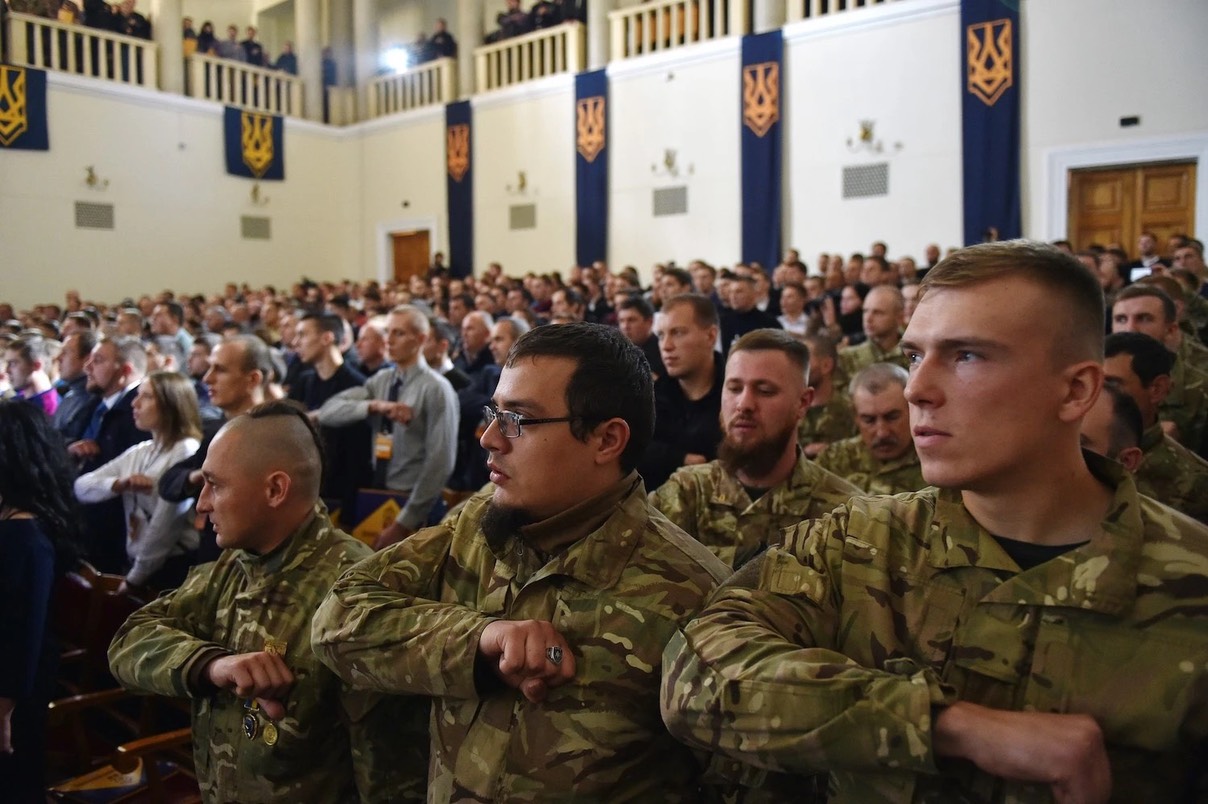SEMENYAKA AND THE NEW HUMAN TYPE
I haven't found such an explicit statement in Semenyaka but she does stress the fact that the Azov movement is largely Russian speaking, it originated in Russian-speaking Kharkiv and the first of its men to fall in combat with the Donbass separatists was an ethnic Russian. (27) My impression is that the main thing for her is the war itself - the mere fact of war providing the pretext for the development of Azov as a military elite, an aristocracy. Something of this can be found in her essay 'The transformation of Ernst Jünger's alternative to the bourgeois individual.' Summarising Jünger's book The Worker (1932), she says:
'Jünger contends that ruin of the individual implies a change of domination. The bourgeois individuals do not vanish without leaving a trace — they are compulsory replaced by the new human “type” which manifests its will to power now. This type is the Worker. Here Jünger makes a series of crucial remarks. He emphasizes that, unlike the bourgeois, the Worker is not an estate … Neither is it a class in the sense of the revolutionary dialectic of the XIXth century. What makes Jünger’s position rather special, the Worker should not be confused with the proletarian. He claims that it is necessary to forget the legend about the economic quality as the main feature of the Worker. It is not surprising that the Worker uses bourgeois vocabulary and sets the questions in outmoded notions, for the rebellion of workers was prepared in the school of bourgeois thought.
'However, now the Worker’s primal task is to quit thinking, feeling, and existing in the old bourgeois forms. Jünger carefully separates this gesture from romantic disobedience … the bourgeois, irrespective of their approval or disapproval, have always treated the worker movements as movements of the slaves. However, Jünger’s central point is that now it is undoubtedly the movement of the masters. After the Workers have left their anarchic roots behind, their demands can be fulfilled only by a new aristocracy.' (28)
(27) 'Olena Semenyaka on the Ukrainian Crisis Part II for Guide to Kulchur podcast', https://interregnum-intermarium.tumblr.com/post/183139437749/national-corps-attended-etnofutur-iii-conference
(28) Olena Semenyaka: Transformation of Ernst Junger’s alternative to the bourgeois individual, 12th November, 2011, https://web.archive.org/web/20160602204720/http://uktk.org/transformation-of-ernst-junger%e2%80%99s-alternative-to-the-bourgeois-individual/#more-480 This comes from the Ukrainian Traditionalist Club and is in awkward English which I have tidied up a little bit.
She continues:
'The projection of work as a particular way of life is technology. As one of the most cited formulas from “The Worker” declares, technology is the means by which the gestalt of the Worker mobilizes the world.
'This corresponds with the new state of society which Jünger calls the state of total mobilization in his essay with the same heading. It means that all domains of life all over the world fall under character of war prepared by the rapid development of technology. As Alain de Benoist remarks:
'"At the same time as war becomes a technical undertaking, the traditional distinction between combatant and non-combatant breaks down. Even the notion of war and peace gives way to the reality of permanent global conflict. Even the pacifist has to be ready to fight for his beliefs! The decisive aspect of the new state of affairs is the fact that all are potentially involved in war and all are available for mobilization."
'Similarly, the type of the Worker displays far more militant sides than those of the bourgeois individual. It is notable for much more casual treatment of death. It is close to the elemental. And it is endowed with radically different sense of freedom which leads to new hierarchy.'
One might question whether this is an accurate description of the working class as we know it today but we might also remember the posters of heroic workers produced by both Communists and Fascists at the time Jünger was writing, posters that would look ridiculous if produced today. The 'bourgeois' idea of the worker which Jünger was criticising has triumphed spectacularly. But we can still read in Semenyaka's essay something of what she thought the Azov movement might be. I began this essay quoting an address she made while still part of the Right Sector in the context of the conflict between the Maidan 'revolutionaries' and the Parliament. She continued:
'this revolution was not an explosion of Ukrainian authenticity itself - it was the locus where the pan-European revolution sprouted and the almost extinct type of warrior - a person, whose main and most valued by society virtue consists in his military and historical existence, because world history is primarily the history of wars. Time to act — the longer we delay, the more legitimacy those people [the parliamentarians - PB] have.' First Congress of the National Corps, October 2016
First Congress of the National Corps, October 2016